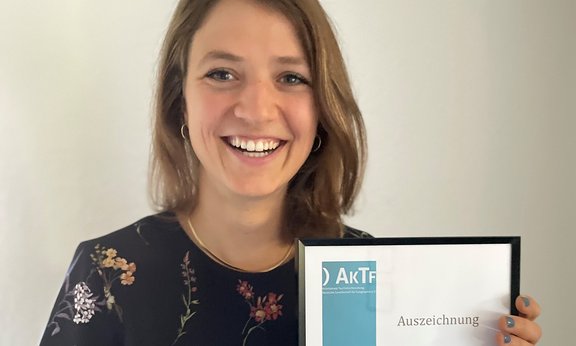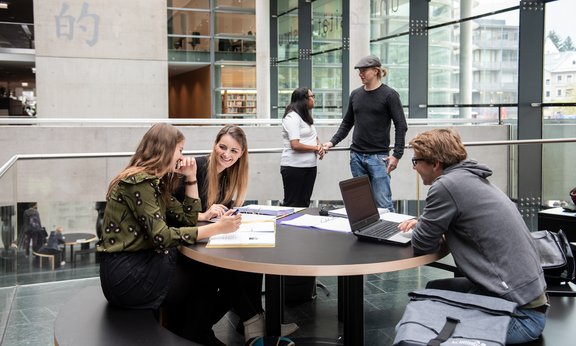Master’s Programme Experimental and Empirical Economics
You want to critically examine individual decision-making processes, corporate strategies and government policies?
In the Master's Degree Programme in Experimental and Empirical Economics students develop academic thinking required for a high-profile career in research, business, finance and the public sector.
The programme is offered by the Faculty of Economics and Statistics, one of the leading European institutions for empirical economics and data science as well as behavioral and experimental economics. Research groups critically examine the decisions of individuals, strategies of firms and the policies of governments to understand and challenge the paradigms in economics and economic policy.
Study Code
UC 066 975
FAQ
Graduates have specialised knowledge in the field of economic analysis. They are able to formulate problems in a professional manner, search for the appropriate data sets and apply the latest methods to these sets. They have the ability to interpret the results obtained and to communicate the conclusions competently to decision-makers who are not experts in the field.
The master’s programme advances and deepens the subject-specific knowledge in the field of economics and lays the foundations for the further development of the subject. The master’s programme qualifies students for independent and managerial work by guiding them to be independent, by sharpening their ability to judge and promoting their ability to make decisions.
The master’s programme is research-based. In addition to expanding the subject-specific knowledge, the master’s programme aims above all at a specialisation in the faculty’s main research areas. In the final Master’s Thesis, the theories and methods learned are applied independently to current subject-related issues.
Graduates of the master’s programme
- have sufficient economic knowledge to familiarise themselves independently and quickly with new tasks.
- can apply their knowledge and skills professionally in order to solve problems in their field.
- are able to successfully apply the acquired methods in research, to critically question them and to develop them further.
- have acquired professional and social competences that prepare them well for leadership tasks.
Examples of occupational opportunities:
- executives in bodies of the EU, OECD, UN and similar organisations;
- officers at the European Central Bank or the Austrian National Bank;
- freelance consultants (e.g. budget policy, environmental policy);
- specialist officers in the state and federal administration (e.g. spatial planning, Ministry for Finance);
- economic researcher at the “Institute for Advanced Studies”, at the Austrian Institute for Economic Research and similar institutions;
- scientific staff at a university or university of applied sciences;
Graduates tracking: Shows which occupational fields students enter after graduation
Faculty of Economics and Statistics Examination Office Information for students with disabilities
Curriculum
From the field

Preis für beste Nachwuchsarbeit gewonnen
Myriam Zollner, Absolventin des Masterstudiums Nachhaltige Regional- und Destinationsentwicklung, hat im Juni bei der Jahrestagung 2023 des „Arbeitskreis Tourismusforschung in der Deutschen Gesellschaft für Geographie (DGfG) e.V.“ in Saarbrücken (D) den „Young Researcher Award“ für die beste Masterarbeit gewonnen.

Intensität des Kontakts zu Geflüchteten beeinflusst Wahlergebnis
2015 fand die Landtagswahl in Oberösterreich auf dem Höhepunkt der Flüchtlingskrise in Europa statt. Der Wirtschaftsforscher Andreas Steinmayr untersuchte in diesem Zusammenhang, wie sich die Präsenz von Geflüchteten auf die Stimmabgabe für rechtspopulistische Parteien auswirkt. Ergebnis: Wo Geflüchtete langfristig untergebracht waren, reduzierte sich der Stimmenanteil für die FPÖ.

Finanzprodukte: Warum wir Risiko falsch bewerten
In einem groß angelegten Experiment hat ein Forscherteam mit Beteiligung der Uni Innsbruck erhoben, wie Laien und Finanzexperten das Risiko von Finanzprodukten wahrnehmen. Ein Fazit: Die Forscher fordern mehr Information bei Finanzprodukten. Die Studie erschien kürzlich im Fachjournal „Management Science“.

Falsch Informierte zahlen mehr
Eine Innsbrucker Forschergruppe um Rudolf Kerschbamer hat, unterstützt vom Wissenschaftsfonds FWF, eine Feldstudie zur Frage durchgeführt, ob sich Kunden in einem Markt für Vertrauensgüter durch den Erwerb von online verfügbaren Informationen vor Betrügereien durch die Verkäufer schützen können. Als Beispiel diente der Markt für Computerreparaturen.
















